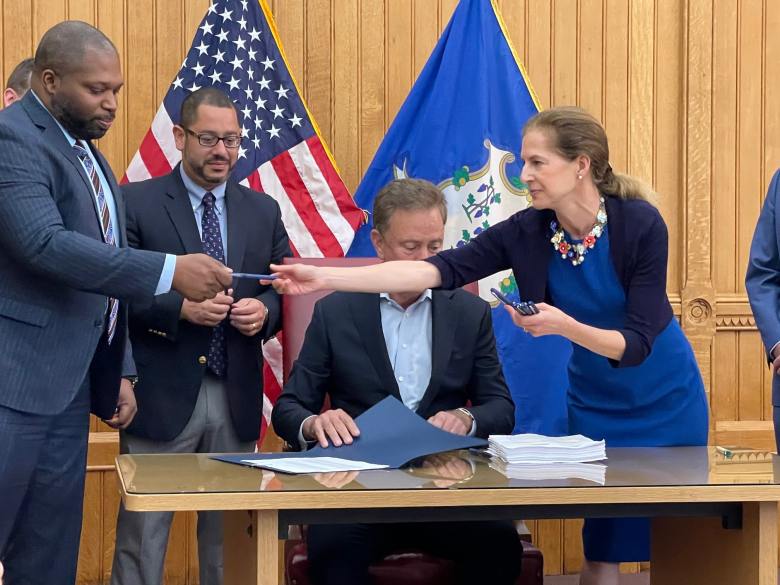
One month after the cannabis legalization bill was signed into law, Gov. Ned Lamont and four of the top six legislative leaders have made appointments to a 15-member Social Equity Council responsible for promoting diverse participation in the developing new industry.
The council already is facing a legislatively-set goal of mid-August for establishing criteria for research into the disparate social, economic and familial consequences of cannabis criminalization and how they can be addressed with a legal marijuana trade.
“I’m proud that the cannabis law includes provisions requiring the state to establish a marketplace that is fair, well-regulated, and places a priority on social equity, particularly when it comes to righting some of the wrongs of recent decades,” Lamont said Thursday.
With the governor’s signature on June 22, Connecticut legalized the production, sale and adult use of recreational marijuana, though the regulation and licensing of growers and retailers by the Department of Consumer Protection is expected to take a year.
Andrea Comer, a former journalist with a second career in government and government relations, is the governor’s choice to be the point person on cannabis as a new deputy commissioner at consumer protection. She currently works for the quasi-public authority responsible for the new paid family and medical leave program.
Comer also will be the Department of Consumer Protection’s designee to the Social Equity Council. By statute, the state treasurer, secretary of policy and management, and the commissioners of consumer protection and economic development or their designees are council members,
In addition to those four, there are 11 appointed members, most required by statute to bring specific expertise or represent certain constituencies. Lamont has four of those appointments, and the six top legislative leaders each have one, as does the legislature’s Black and Puerto Rican Caucus.
“The carefully selected and well-qualified Social Equity Council will play an important role as Connecticut’s cannabis marketplace transitions from one that has been dangerous and unregulated, to one that will support a new equitable sector of our economy,” Lamont said. “In the coming years, it will play a crucial role in reinvesting broadly into the most impacted communities.”
How to define social equity in the new industry was among the most difficult questions for Lamont and lawmakers to resolve.
Commercial production licenses for the recreational market would cost as much as $3 million, while the fee for a micro-cultivator would be $1,000. Half of all licenses for cultivation, packaging, transportation and sales are reserved for social equity applicants, who must be from census tracts disproportionately impacted by the war on drugs.
The majority of states offer varying degrees of cannabis legalization, decriminalization, or medical-use only. Connecticut is the 19th state to opt for full legalization, joining northeast neighbors: New York, Massachusetts, Vermont, Maine and New Jersey.
Join in the work of CT Mirror
You may not be on staff, but you can produce the journalism.

On Thursday, Lamont announced two of his four appointments to the Social Equity Council: Joseph Williams, a business advisor and trade specialist at the Connecticut Small Business Development Center at UConn; and Kelli Vallieres, the executive director of the Connecticut Office or Workforce Strategies.
They meet the law’s requirement that he appoint one council member with experience in economic development and another in workforce development. His third appointment must be an individual from a community disproportionately harmed by cannabis criminalization. The fourth is at his discretion.
Senate President Pro Tem Martin M. Looney, D-New Haven, named Mike Jefferson, a lawyer from New Haven and former legislative clerk.
House Speaker Matt Ritter, D-Hartford, named Subira Gordon, the executive director of ConnCan, the education advocacy group.
Senate Majority Leader Bob Duff, D-Norwalk, named Edwin Shirley, a senior advisor at Fairview Capital.
House Minority Leader Vincent J. Candelora, R-North Branford, named Corrie Bettes, a Realtor in Hartford.
No selections have been made by House Majority Leader Jason Rojas, D-East Hartford; Senate Minority Leader Kevin Kelly, R-Stratford, or Rep. Gerry Reyes Jr., D-Waterbury, chair of the Black and Puerto Rican Caucus.
Rojas, who led the negotiations that produced the cannabis bill, said he expects to make a choice after interviewing a candidate Monday, part of what he called his due dligience.
“The members of this council will play an essential role in the implementation of our adult use cannabis marketplace,” he said.
Reyes and Kelly each said they are close to appointments.
Arunan Arulampalam, one of the Lamont administration officials who worked on the bill, was expected to be the deputy commissioner at consumer protection overseeing cannabis regulation, but he resigned recently to become the chief executive officer of the Hartford Land Bank.
Comer will begin her job on Aug. 23.
The Department of Consumer Protection is taking on oversight of two new industries: recreational cannabis and online gambling and sports betting.
Maureen Magnan, the former chief of staff for the House majority, also will be joining consumer protection as a deputy commissioner, allowing Commissioner Michelle Seagull to focus on developing new gambling regulations.
Free to Read. Not Free to Produce.
The Connecticut Mirror is a nonprofit newsroom. 90% of our revenue comes from people like you. If you value our reporting please consider making a donation. You’ll enjoy reading CT Mirror even more knowing you helped make it happen.

